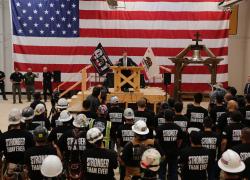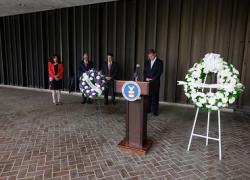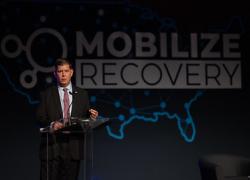Last week, I traveled to Wolfsburg, Germany, for the Labor and Employment Ministerial Meeting of the G-7, the premier forum for democratic, industrial member countries to coordinate their economic, social and security policies. There, I met with counterparts from G-7 countries to discuss solutions to advance good jobs, lifelong training, safe workplaces and global supply chains free of labor abuses. Here are some highlights of my trip.
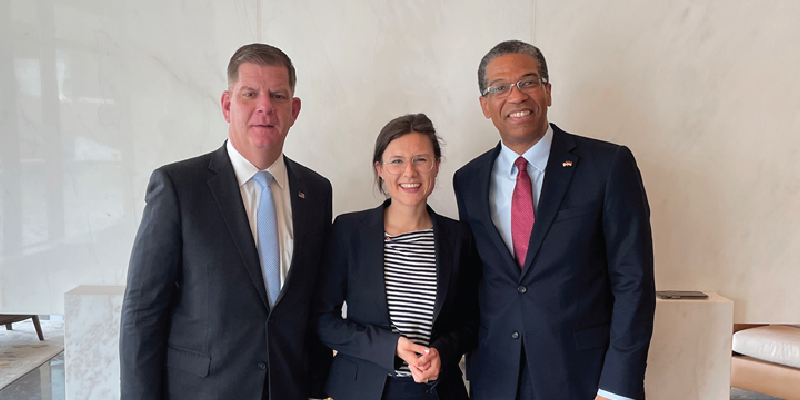
Monday, May 23
Over lunch, I met with Darion Akins, Consul General in Hamburg, and Clara Kallich, an inspiring young leader and founder of Youth Lead the Change Germany. After seeing participatory budget projects in the U.S., Clara imported the model to Germany and founded Youth Lead the Change to empower youth to decide how to secure city government funds for community projects.
Next, I signed a new cooperation agreement with Germany’s Minister of Labor and Social Affairs, Hubertus Heil, to promote decent work; foster sustainable, resilient global supply chains; strengthen the implementation of labor standards; and eradicate child and forced labor, human trafficking and modern slavery. Minister Heil shares my commitment to supporting workers’ right to organize in our countries and around the world, and I’m confident that our partnership with Germany will deliver for both U.S. and German workers. The next day, during a Volkswagen factory visit, I saw firsthand some German skills development programs and apprenticeships that can help inform our own programs in the U.S.
I was happy to go straight from my discussion with Minister Heil to a bilateral meeting with Yasmin Fahimi, the first woman to serve as Chair of the German Trade Union Confederation, the German equivalent to the AFL-CIO, representing 6 million workers across multiple economic sectors.
I’m always grateful for the opportunity to talk with unions. During my conversation with Chair Fahmi, I highlighted the efforts by the Biden Administration to advance freedom of association and collective bargaining domestically and internationally. We talked about how we could work together and she expressed interest in partnering with us on the M-POWER initiative and engaging in dialogue on workers’ rights, as well as the need to educate the public about unions.
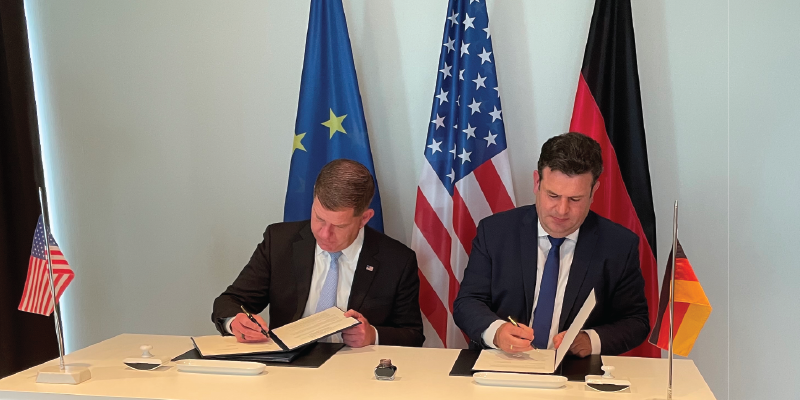
Tuesday, May 24
I started my morning with a meeting with Thérèse Coffey, the United Kingdom’s Secretary of State for Work and Pensions. We discussed skills development as critical to responding to labor market changes and building back better from the pandemic. We also talked about apprenticeships, increasing labor market participation, the green transition, and reskilling workers for the jobs of the future. I look forward to meeting with her again this summer.
At the G-7, we are working to strengthen a high-road approach to the global economy based on worker rights and democratic values, so our Ministers’ Meeting began with G-7 countries speaking with one voice against Russia’s aggression in Ukraine. We condemned this unprovoked, unjustified war and the far-reaching economic, social and political consequences both regionally and globally. I was reminded of a chat I had the night before with a young Ukrainian working as a waiter. It wasn’t a meeting on my schedule – we simply crossed paths in a hallway when I was heading to dinner – but he shared he had come to Germany to learn about the hotel business, after his family relocated in Ireland from Ukraine. When the G-7 ministers shared our deep concern with the destruction of workplaces and the devastating impact on the safety and the livelihoods of workers, employers and their families in Ukraine, we were thinking about people just like him.
Our discussions in the meeting addressed some of the most critical issues to workers in all our countries, like occupational safety and health, rising energy costs, the growing food crisis, and the necessity of preparing and protecting workers as our governments act to address climate change. We also discussed strategies to enhance workers’ employability in times of structural change, integrating refugees into the labor market, and the implementing ILO Recommendation No. 205 on Employment and Decent Work for Peace and Resilience.
In a session on sustainable value chains, I spoke about the U.S. approach to combatting child and forced labor and enforcing trade agreements to protect workers across global value chains. As always, I emphasized that when workers can freely raise their voices and organize, they can defend their rights and advance their interests, negotiate better wages and working conditions, and advance democratic values and practices in their workplaces. Within the G-7, ministers recognize that organized, empowered workers use their voice beyond the factory floor: They demand an end to workplace violence and discrimination, call out corruption, and resist authoritarianism – and most critically to G-7 countries, empowered workers build vibrant communities, inclusive economies, and democratic societies.
I let my counterparts know that the U.S. is ready to partner with everyone committed to safeguard dignity at work – in our own countries and around the world. Outside the Ministers’ Meeting, I had some great one-on-one discussion with my counterparts. EU Commissioner Nicolas Schmit and I discussed how to regulate the platform economy, including ensuring worker protections and the social aspects of programming. Over coffee with Andrea Orlando, the Italian Minister of Labor and Social Policies, I had a chance to discuss how green and digital transitions are impacting our workers, the integration of migrant workers, and long-term resilience of global value chains.
The trip ended with dinner with our Department of Labor team, who worked incredibly hard behind the scenes to make our participation in the G-7 Labor Ministerial a success. I am consistently proud of the diverse and talented professionals we have at the Department of Labor.
This G-7 Labor Ministerial expanded transatlantic cooperation on apprenticeships, workforce development, workplace democracy, safe workplaces and climate change, among other important issues. We adopted a communiqué on agreements, action and joint steps towards a just transition and the creation of decent, high-quality work for a sustainable green economy. In this way, my trip to Germany helped strengthen cooperation and solidify commitments to the benefit of all workers, here at home and abroad.
Marty J. Walsh is the U.S. Secretary of Labor. Follow him on Twitter and Instagram.

 U.S. Department of Labor Blog
U.S. Department of Labor Blog
